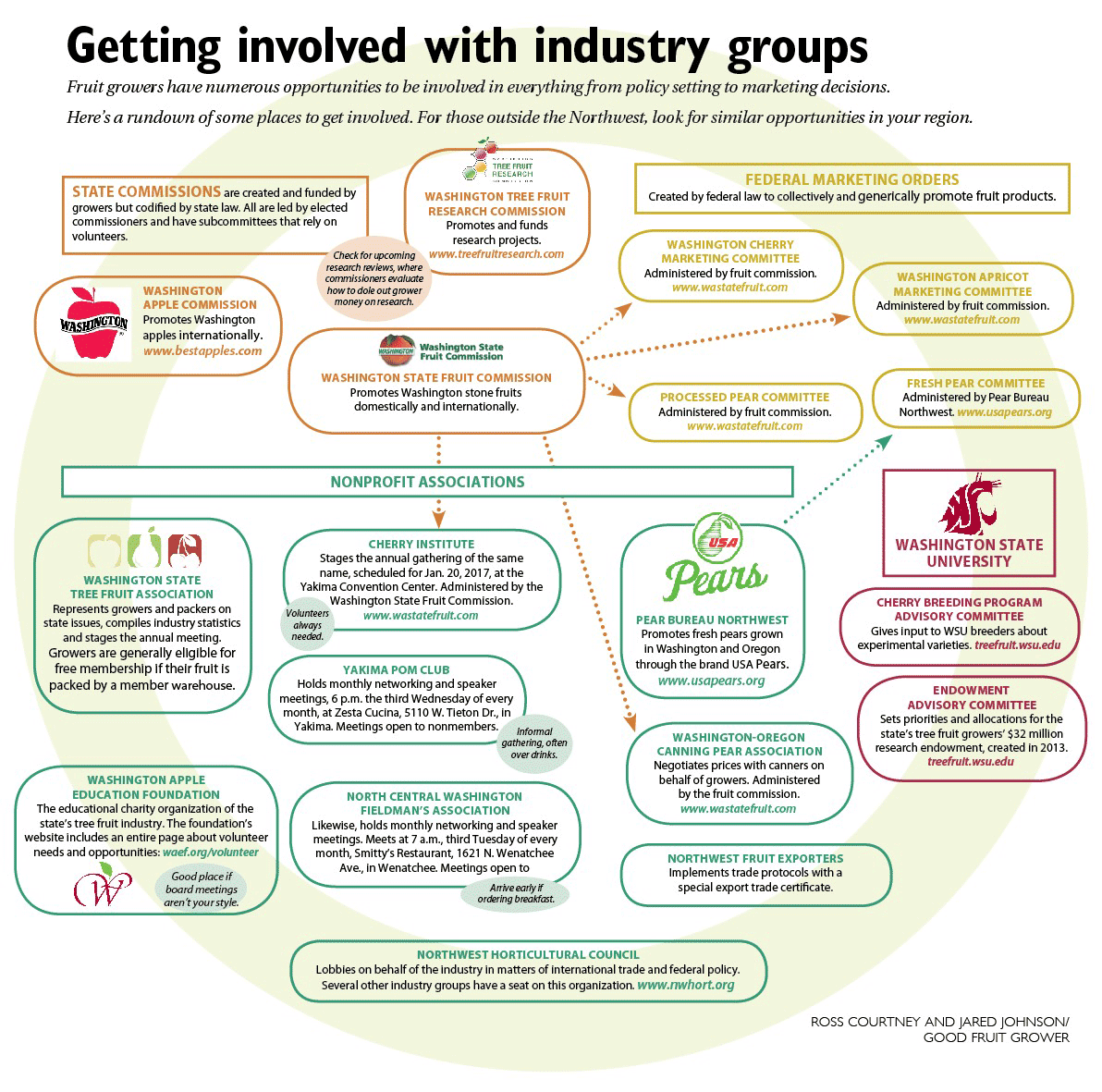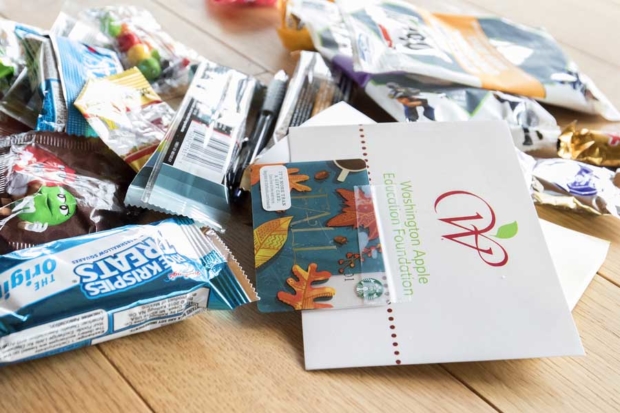In Washington’s tree fruit industry, three state commissions, four federal marketing orders, numerous nonprofit associations and a few advisory committees all intertwine to create a network of industry organizations to support growers.
All that representation, with their acronyms, subcommittees and meeting schedules, provide places for growers to get involved and learn — and similar opportunities can be found in other regions.

That’s what Jeff Pheasant likes about his role as a board member for the Washington State Tree Fruit Association. “You get a better feel for what’s going on and keep up with the changes,” said Pheasant, owner-operator of Pheasant Orchards in Soap Lake.
But there’s more than board memberships. The groups usually have committees, subcommittees and volunteer roles that also need grower participation.
The organization with the most variety of volunteer opportunities is probably the Washington Apple Education Foundation, the educational charity for the fruit industry.
The Wenatchee-based group relies on volunteers to mentor students, provide job shadows, select scholarship recipients and send care packages to students.
A quick look at the group’s volunteer page on its website shows the diversity of roles.
The foundation is overseen by volunteer board members, most of them growers, but the committees frequently need more bodies, said Jennifer Witherbee, executive director of the foundation.
For example, up to 60 people participate on the scholarship selection committee, spending about 30 hours each during the spring reviewing applications.
Volunteers on the student stewardship committee help steer students toward career opportunities by arranging job shadows and connecting them with internships. Members of the investment committee help monitor activity and oversee the investment advisor.
“Most of our volunteers would say it’s very personally rewarding,” Witherbee said.

Washington Apple Education Foundation scholarship winners receive care packages — put together by volunteers — that include gift cards and treats. (TJ Mullinax/Good Fruit Grower)
Pear Bureau Northwest often recruits growers to help distribute samples at in-store promotions, discussing the pears they nurture, said Kevin Moffitt, president and CEO of the Portland, Oregon, nonprofit that represents Washington and Oregon pear growers.
Likewise, the Washington State Tree Fruit Association, which represents the industry in state issues, often would like more help bending the ear of state legislators and regulators about agricultural issues during the annual Tree Fruit Day in Olympia, scheduled for Jan. 31.
Staff members will set up appointments but would prefer farmers themselves do the talking.
They make a stronger impact because they put a face on an issue and don’t mince words, said Jon DeVaney, the group’s president. “Growers are their own best advocates.”
DeVaney also recommended growers just stay informed as much as possible.
An easy place to start would be the Yakima Pom Club. The group meets once a month in a relatively casual setting over drinks at a Yakima, Washington, restaurant.
Past programs have included discussion about thinning or soil monitoring, researchers talking about their work and political analysis. DeVaney himself shared his take on the upcoming elections with the Pom Club at the September meeting.
The Pom Club’s Wenatchee sister group is called the North Central Washington Fieldman’s Association, usually the NCW Fieldman’s Association. “But we have women, too,” said Dawn Milne, the group’s event coordinator. Membership is not limited to field representatives, either. Warehouse workers, industry officials, growers and others participate.
The meetings for both groups are open to nonmembers.
Despite the unofficial settings, the groups play a critical role in the industry, teaming up each year to stage the Northwest Hort Expo, the trade show held during the Tree Fruit Association’s annual meeting, and use the proceeds to fund scholarships and grants. (The Washington State Tree Fruit Association Annual Meeting and NW Hort Expo is Dec. 5-7 at the Wenatchee Convention Center.)
The Washington Apple Commission is led by elected commissioners, but the Wenatchee group that oversees international promotions has committees open to other growers and industry members, such as the Market Access Committee, involved with opening the Chinese markets two years ago.
All commission meetings are open. “Growers don’t have to be committee members to attend,” said Commission President Todd Fryhover. “All of our meetings are posted and available to anyone who wishes to attend.”
As for industry board members, most are recruited by people already involved with the groups, sometimes an outgoing position holder looking for a replacement. But that doesn’t mean they’re always full.
Some of the federal marketing orders require alternates in case the board member can’t attend.
“It is hard to fill all the alternate spots,” said B.J. Thurlby, president of the Washington State Fruit Commission, contracted to manage three marketing orders. The Cherry Institute, an annual January gathering in Yakima, always needs help.
Grower participation in the industry beyond just the orchard is in everybody’s best interest. “Collectivity … is the only way to keep your strength,” Thurlby said.
The growers get a lot out of it for themselves, too. “Some of it’s kind of self-serving,” said Pheasant. As an independent grower in a remote area, he sometimes feels isolated and relishes the opportunity to rub shoulders with people who understand different parts of the industry, such as packing, food safety and human resources.
Morgan Rowe of Rowe Farms in Naches felt the same way. “I’m not a packer,” he said. “…I don’t know the business side as much.” Rowe is board member for the Tree Fruit Association and the Cherry Institute.
Even the big guns learn something from their involvement.
Executives from Stemilt, the Wenatchee industry giant, hold three key board positions — president West Mathison is on the Apple Commission, vice president for sales and marketing Mike Taylor is on the Pear Bureau Northwest and sales director Tate Mathison is a member of the Fruit Commission. They do it to stay aware of the industry outside their own company.
“Kind of giving us a higher level view of where the industry is at and where we need to go,” Tate Mathison said. •
ONLINE
Check out www.nwhort.org/trade-associations-commissions-links for a comprehensive list of links to regional and international industry organizations.
– by Ross Courtney






Leave A Comment